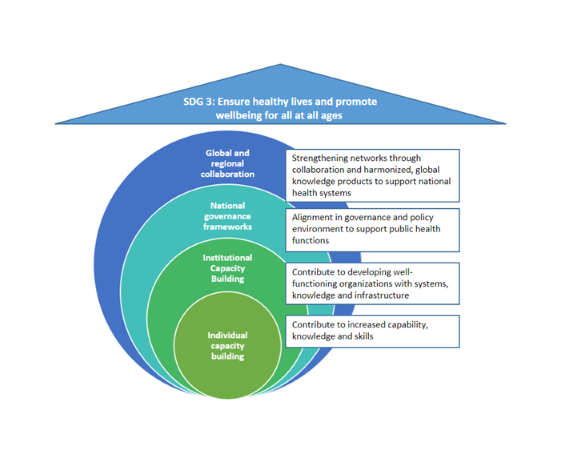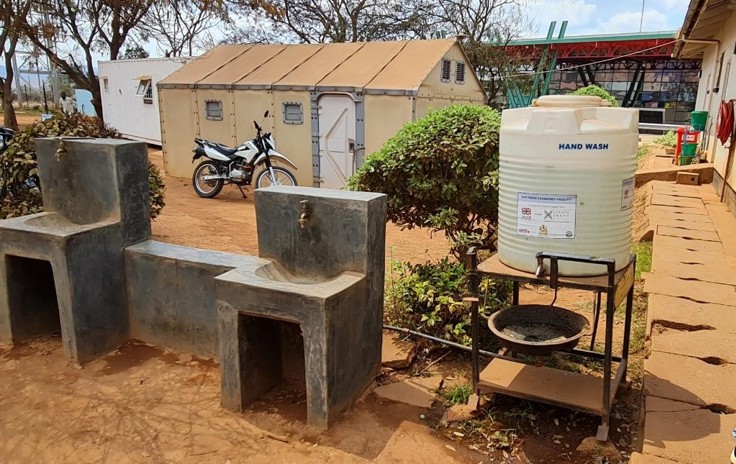Building Stronger Public Health Institutions and Systems (BIS)
Building Stronger Public Health Institutions and Systems (BIS)
Article
|Last update
The Norwegian Institute of Public Health (NIPH) began a new Norad-funded program (2021-2025) aiming to strengthen public health institutions and systems in Low- and Middle Income Countries (LMIC).
The goal of this new program -"Building stronger public health institutions and systems " (BIS) – is to contribute to the building of competent and resilient health systems underpinned by strong public health institutions in 6 countries and through global and regional work. This program not only provides an opportunity to share knowledge in all directions – strengthening public health here in Norway and abroad. The program vision is to reduce morbidity, mortality and poverty associated with diseases by working in partnership with public health institutions and in line with Sustainable Development Goal 3.
As such, collaboration activities will be carried out in three countries where NIPH has a long-standing tradition of collaboration: Ghana, Malawi and Palestine. In addition, NIPH is also exploring collaboration opportunities to build public health capacity in Ethiopia, Nepal and Uganda. The BIS program further expands upon Norad-funded activities under the Global Health Preparedness Program (GHPP) and Universal Health Coverage (UHC) programs.
The program will also contribute to building public health capacity through global and multinational organizations, like WHO, Africa Center for Disease Control and Prevention (Africa CDC) and the International Associate for National Public Health Institutes (IANPHI).The program is funded by Norwegian Agency for Development Cooperation (Norad).
Principles and Main Outcomes
The program is based on principles of equality and mutual learning, national ownership and sustainability, and responsible ethical behavior. Best available knowledge and adaptability are central issues in the cooperation. The human rights perspective is fundamental in the program. Other cross-cutting issues are gender, climate, and zero tolerance to corruption in all its forms.
As context is starting point, and choice of areas for co-operation is based on mutual interests and demand, the identified areas for cooperation vary. However, the areas include strengthening systems and institutions, communicable and non-communicable diseases, data systems and data management, and emergency preparedness. The main outcomes are: stronger public health functions, capacity building for public health, and increased support to LMICs from global networks and organisations.
Multilevel Public Health Capacity Building
The key to change for the BIS program builds on the concept of twinning: National public health institutions and partners linking up and sharing expertise and engaging in long term partnerships in order to develop and improve systems and capacity, each in its own national context and as part of the global health architecture.
The approach includes technical and scientific cooperation according to international standards and procedures. It is about working together, sharing expert advice, challenging each other, building knowledge and systems, as well as, linking our partners to international level networks with particular focus on promoting equity, human rights and the role of women in governance.
This work aims to foster public health capacities at four levels: 1) individual level, contributing to increased capability, knowledge and skills, 2) the institutional level, by supporting organizational level systems and knowledge, 3) the national level, to align policy with public health functions, and 4) the global and regional level to facilitate collaboration and learning with national systems. However, our focus will depend on the context and gaps identified in the selected countries, thus some country-specific outputs may be increasingly focused on one level – with a long-term aim to work towards a more comprehensive approach. The figure below depicts the four levels of our public health capacity building model.

BIS Management Team
- BIS Manager: Knut Nyfløt
- Country Coordinator: Mari Nythun Utheim and Silje Gunlaug Yun Eng
- Grant Manager: Andrea Indrehus Furuli


